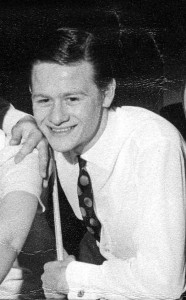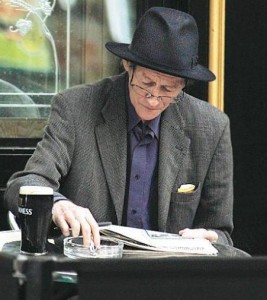(With apologies to Bob Dylan for the title)
Each year, the Oxford Dictionary of National Biography (DNB) is updated to bring in famous and significant people who have recently died. This year’s intake to this essential reference work has recently been publicised in the press for its emphasis on what Vanessa Thorpe in The Observer called “rebels and mavericks”, including comedian Norman Wisdom, designer Alexander McQueen, and novelist Beryl Bainbridge. I’m delighted to have been involved in this process, as I’ve written the entry on the biggest sporting maverick amongst the new entrants, snooker player Alex ‘Hurricane’ Higgins (1949-2010).

Alex Higgins in 1968, at the start of his career
Higgins was a fascinating person to write on, and a big change from most of my previous contributions to DNB, like athletes Jack London, William Applegarth, Donald Thompson, and Christopher Brasher. Only athletics promoter Andy Norman, a deeply controversial figure both inside and outside the sport, has provided such a challenge: how to represent a miniature biography in a balanced way without denigrating the achievements or glossing over the more difficult aspects of the subject’s personal life. As DNB editor Lawrence Goldman put it in his interview with Thorpe, “nobody would be kept out because they were disreputable”, and there were many aspects of Higgins’ life that fell into this category. His widely publicised drinking (before, during, and after matches) and acknowledged cocaine use, his extra-marital affairs, his frequent rows with officials, journalists, and fellow players, and his violent outbursts that got him banned from the game all spring to mind. And he is a classic example of the importance of the controversial aspects of family lives that Goldman noted when he said “Our job is to represent their marriages, their children and even their bastards”, especially as Higgins denied his paternity of one child. I’ve had to balance this with his achievements in winning the world title twice, and the immense popularity and goodwill that his inspired in his brief spell as the people’s champion. The pathos of his later years, when Higgins, in declining health, lived out his life in relative obscurity and died alone, adds another twist to the difficult life.

Alex Higgins in 2008, two years before his death
Like many academics, researchers, and readers, I value the DNB for the way in which it provides short lives and a way into the fuller biographies of thousands of famous and notable individuals. Its grouped lives, such as those of the 1930s Foreign Office Glamour Boys or the key figures in the Suffragette movement, are also models in collective biography. As a sports historian, I applaud the way in which the editors have broadened the Dictionary’s remit to ensure that key figures from all areas of popular culture are now included alongside the project’s more traditional concerns. Higgins, a figure who could attract television audiences of millions to watch his dynamic snooker, and who could command more column inches on the front pages of the papers than on the sports pages, deserves to be in there, along with the other “rebels and mavericks”.
Access: A brief extract from my piece on Higgins appears in The Guardian. The DNB is a subscription service, available here. Most university and public libraries in the UK subscribe to it – check with your institution.
